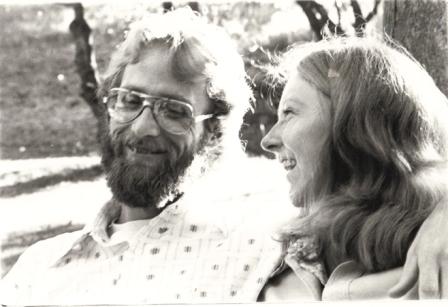
Murray's Blog 2013
Occasional reflections on the Journey...
Or view entries from other years.
Please note subjects are not time-sensitive.
If you'd like to be notified of postings or make a comment, please send a note...
Christmas is far from a sentimental affair
Jesus, though True King, was born in manger (like the one depicted, right). His coming triggered a comic battle (take a moment to click the link; best Advent devotional I've encountered in an era of broadening persecution of Christians) and soon became a refugee. Jesus brought light into the darkness but experienced the evil of this world profoundly with us, even as He overcame it.
Few movies are better able to depict this than the true story of combatants from
three nations (French, German and Scots) in World
 War
I who recognized Christmas to be greater than their nationalistic differences.
War
I who recognized Christmas to be greater than their nationalistic differences.
After troops celebrated Christmas together some commanders disbanded and redeployed their regiments to the Russian front for fear that Christ was greater than war.
Watch it. You may not have a more profound experience of Christmas this season.
(Get it at Amazon. The story is also written as a historical documentary should you wish further detail.)
Christmas is for everyone. Reflect with gratitude on this reminder from St. Augustine of Hippo:
Let the just rejoice,
for their justifier is born.
Let the sick and infirm rejoice,
For their saviour is born.
Let the captives rejoice,
For their Redeemer is born.
Let slaves rejoice,
for their Master is born.
Let free men rejoice,
For their Liberator is born.
Let All Christians rejoice,
For Jesus Christ is born.
Remember: "Jesus didn't come to build a kingdom - He brought one with Him. He IS the kingdom. He's the entry point to it." - Carl Medearis
November 8, 2013
Turning the Queen Mary:
Why is Christianity in the west in decline? At
the risk of overstatement the church is broadly viewed as soft, feminized and
somewhat in retreat. By contrast Islam is seen as bold, masculine and strident.
What is the central factor in the soft Christendom of the west?
In my view it is a low level of Christian discipleship. The western experiment
with seeker sensitivity has been found wanting and is winding down.
The invitation to follow Christ is unhelpfully understated when presented
over-simply as God's "wonderful plan for your life" with the inference of
happiness and comparative ease. Following Christ is better than the life of sin,
certainly, but not easier than drifting downstream in a culture bent on
self-aggrandizement, or happier than painful spiritual warfare.
What is evangelism according to Jesus?"Those who want to be my disciples must deny themselves and take up their cross
and follow me. For those who want to save their life a will lose it, but those
who lose their life for me will find it. What good will it be for you to gain
the whole world, yet forfeit your soul? Or what can you give in exchange for
your soul?" (Matthew 16)
Some will ask "in what sense is this good news?" It is good news at minimum in
that Christ gives meaning to suffering, power to overcome the works of the evil
one, life in community bearing eternal fruit, participation in good news for the
poor and oppressed, and sight for the spiritually blind.
What if - at the centre of our concept of discipleship - there came to be not
books like "How to be Happy" or "How to Win Friends and Influence People" but instead books like
"Pilgrim's Progress," "The
Cost of Discipleship" and "The Normal Christian Life"? Far better, more accurate
and in line with Jesus' view of the Gospel.
Knowing the Christian life is a battle against evil would restore not only the
Gospel to the Church but also men. In a survey several years ago asking why
people come to Christ we learned that, while motivations vary, women generally
come seeking forgiveness and relationship, while men come seeking purpose. We
know also that men prefer worship songs
 with
a call to mission rather than inviting Christ's embrace. Can we not take courage
to overcome political correctness and sing again "Onward Christian Soldiers"
knowing the battle is not against boredom or other human beings, but against the
very hosts of Satan? Can we not restore a biblical worldview to the church?
with
a call to mission rather than inviting Christ's embrace. Can we not take courage
to overcome political correctness and sing again "Onward Christian Soldiers"
knowing the battle is not against boredom or other human beings, but against the
very hosts of Satan? Can we not restore a biblical worldview to the church?
Turn the Queen Mary? I believe we can and must. The call of the Gospel is not to
health, wealth or the fulfilment of human potential. It is to restored
relationship with God, to fight the works of the devil, to defend the weak and
downtrodden and to stand at personal cost against injustice for the sake of the
King of Righteousness.
October 31, 2013
Reformation Day:
Martin Luther was certainly not the first, or arguably best, reformer. But he did what he knew had to be
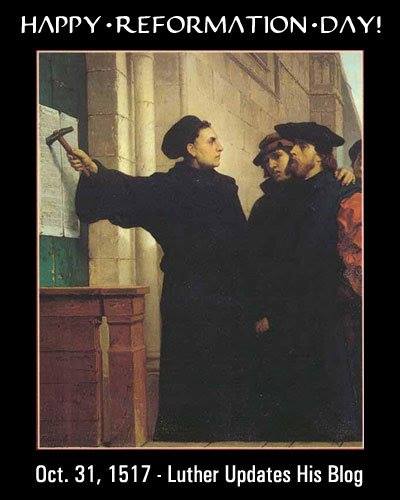 done
in his day to call the church, which he loved and of which he was part, back to
biblical foundational truth. It was not Luther's intention to separate as a
"protest-ant" movement, only to renew the church to which he was committed.
done
in his day to call the church, which he loved and of which he was part, back to
biblical foundational truth. It was not Luther's intention to separate as a
"protest-ant" movement, only to renew the church to which he was committed.
This call to Christ alone, Scripture alone, the renewal of faith and costly obedience in our day and context is never to be taken for granted but remains the call of Christ to all who follow Him in our challenging world.
On October 31 many focus on Halloween. Better to focus on "All Hallow's Eve" of Catholic and Anglican tradition - which remembers the 100's of thousands of martyrs for their testimony to Christ over the ages, an honourable practice dating to the 4th century AD.
Better also than Halloween this evening is to focus on the renewal and strengthening of the Christian community of which you are a part as a follower of Christ - re-reading Revelations 2 and 3, listening to the Risen Lord call again: "Whoever has ears, let them hear what the Spirit says to the churches" and responding in obedience with earnest heart and diligence.
October 19, 2013
"All my Fountains are in You"
In recent days I've found myself meditating on this truth from Psalm 87:7. The psalm points to the singular source without which we are nothing and have nothing. All our fountains flow from You.1 What are these fountains which flow from God?
-
The universe sprang forth from God. As much as some would like to think the universe to be the great cosmic accident, it is not so. It is designed, purposeful, amazing and reflects the glory of it's Fountain.
-
Our very physical life is from God. The breath in our lungs is from Him (Job 33:4). In Him we live and move and have our being (Acts 17:25, 28).
-
Foundational to our physical lives are our spirits which animate us. Scripture call God the "Father of our spirits" (Heb. 12:9). God is the fountain from which our spirits are born and the One to whom our spirits return on the day of accountability.
-
The source of the image of God in which we have been created is from the fountain who is God (Gen. 1:27). The image of God is expressed in humans as maleness and femaleness, free will, intelligence, emotions, the ability to reason and learn, love, hope, plan, live in community as the Trinity lives in community and so much more. All this enables human culture, music, art, literature, education, medicine, science to mention but a few.
-
Righteousness, justice and the very concept of morality has it's source the gracious fountain of God's call that we be holy as He is holy (Lev. 19:2). All humanity's abilities yet retain the capacity for great evil where we choose to drink from streams other than the fountain of God's grace and holiness.
-
From God alone flows forgiveness and eternal life. The blood of Christ shed on the cross and symbolized in the Eucharist is the cleansing stream of forgiveness without which we remain in our sin and its power over us. The power of God-become-flesh for us in Christ on the cross and his resurrection is the fountain of freedom from this bondage for eternity.
Some wonder why Christians are optimistic about the future with God but pessimistic about the direction of society which rejects God. There is in fact a reason. We cannot cut ourselves off from the Fountain which is the source of our life and of all good and expect to make on our own a better way.
October 10, 2013
What People Say:
Don't believe what people say about you. Sometimes what people say reflects as much or more about them as it does about you. Some examples:
-
"As a composer," declared the music teacher, "he is hopeless!" The student's name was Ludwig van Beethoven.
-
At 21, he got a job at a department store, but he wasn't allowed to wait on customers. The manager said he didn't have enough sense to know how to serve a customer. The clerk's name was F.W. Woolworth.
-
A young newspaper writer was fired by his editor who said the boy just had "no good ideas." The youngster was Walt Disney.
-
He got a "C" on his student project in his college business class. The professor said his proposal for an overnight delivery service wasn't feasible. The student was Fred Smith, founder of Federal Express.
As Keith Wishum reminds us, "What people say about you does not determine what you are."
What does matter is how God sees us and what God says about us. And whether we believe him. God speaks of our worth, dignity and ability empowered by the Holy Spirit in the incarnation, cross and resurrection of Jesus Christ. We are called and destined to Christlikeness in Him.
September 22, 2013
But for God's Mercy:
It could have been nuclear winter over the American
east coast, so much closer than we knew. I was 12 in 1961. My parents, only 17
years removed from Hitler's horror in Holland (my
father's memoirs), saw ominous signs on the political landscape. They
responded by building a structure they hoped would protect their family from
radioactive fallout following a nuclear bomb they hoped would never fall. This
was prior to the Cuban missile crisis, so well depicted in the docu-drama
Thirteen Days - one of my favorite movies.
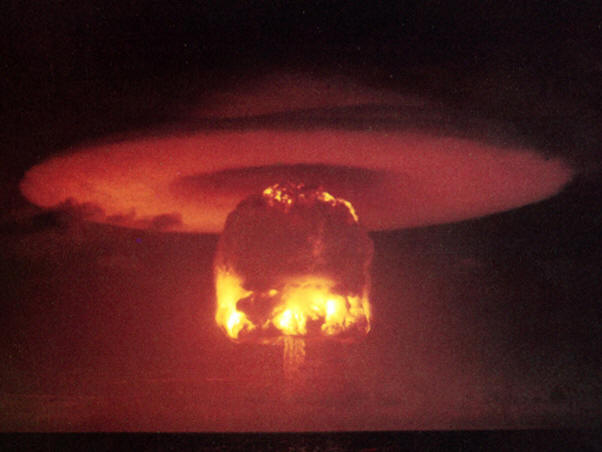
But I'm referring to something else, with the potential of equal devastation of which most of us were unaware. The event took place on January 23, 1961 and only the unintended failure of one low-voltage switch prevented a nuclear bomb - 260 times more powerful than that which exploded over Hiroshima and Nagasaki in September 1945 - from landing on North Carolina and changing the course of history.
But for the grace of God.
The event had been "classified" until recently and kept from public knowledge. I learned of it while in England yesterday from BBC: http://www.bbc.co.uk/news/world-us-canada-24183879. Some will view the now "declassified" event as an interesting historical side-bar. To do so however is to fail to see the hand of God and give thanks for his mercy! How often God has intervened in ways we have not known will only become evident when we see him face to face. When we get a glimpse of his mercy, as in this situation human sin notwithstanding, we are re-assured of his sovereignty in directing the course of history, as well a his tender mercies towards all he has created.
August 30, 2013
The China Study:
A member of the family introduced us to a remarkable study of the effect of diet on health: The China Study by T. Collin Campbell (ISBN 978-193210066-2). No, it's not the latest high-carb or no-carb approach but something more fundamental based on a study of provinces in China where diet habits vary greatly and are reflected in profound differences in rates of heart disease and cancer. A video introduction is also available - "Forks Over Knives" http://viooz.co/movies/976-forks-over-knives-2011.html (just watch the presentation; ignore the adverts).
True, most people can eat what they will for many years. Our bodies are amazingly resilient for a long time. But in time - and it's actually not as long as many think - our health reflects what we eat. As you read the book and/or watch the video you're not likely to say "it's not true" or "it doesn't matter." At that point, the ball is in your court.
July 24, 2013
Facebook:
Ok it's true, I've wasn't ever a great fan of Facebook. I prefer one-to-conversations in real-time. But watching The Social Network put me over the edge. If you want off, the current link is actually - to the credit of Facebook - easier to find than ever before: https://www.facebook.com/help/delete_account
July 10, 2013
An (Ethical) Free Press:
In reflecting on a British tabloid with a friend, the friend agreed with my analysis of the low level of journalism represented but insisted that it was the price which had to be paid for a free press. With that much I tend to agree but I want more. Even if you agree (and I know many don't) that much of true journalism is dead, leaving predominantly propaganda, censorship and, when that doesn't work, character assassination from an increasingly activist press - you will probably agree that even such flawed free press is better than a government controlled press.
Even so, we can aim higher. A free press must also be an ethical press. (By ethical, I mean a press which avoids bias, purposeful distortions and censorship of news which does not align with its political or ideological purposes. An ethical press will report rather than seek solely to shape public opinion. An ethical press will aim for the highest level of objectivity possible. Where it cannot do so, an ethical press will provide opportunity for the regular expression of contrary opinion on its editorial page.) If a free press is not ethical, such a press is different from a government controlled press only in who controls it - perhaps an ideology, money or other interest - leaving no more freedom and providing no broader range of opinion than a government controlled press.
July 3, 2013
Transhumanism
How might Christians view the growing interest and capacity towards transhumanism - touted as becoming "more than human"? More is good, right?
Google is working towards a future which will hold a transfer of the chip in their "Glass" into the brain of the person who wants access to more information (presumably alongside the chip currently in your credit card). Some militaries are interested in building better fighters by introducing bionic limbs and the genetics of animals which have greater muscle strength or endurance than humans. Some streams of science fiction envision a world in which humans become gods or are already greater than the God whose existence is denied. But transhumanism is not science fiction and remaining gaps between science fiction and transhumanism are rapidly diminishing.
Are these likely scenarios? In my view that's the easy part. Increasingly they
are. Historically most ideas that are conceived and pursued are eventually
realized. Ethics are rarely seriously considered until after the fact and then
never have the power to roll-back the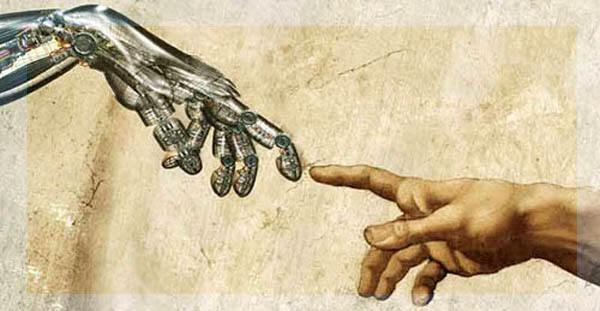 technology for long. (Some will suggest
atomic bombs prove the exception. History will tell, as increasing numbers of
(rogue) states develop the technology.)
technology for long. (Some will suggest
atomic bombs prove the exception. History will tell, as increasing numbers of
(rogue) states develop the technology.)
The harder question is, will we have a choice about participating in transhumanism? In the sense of living in a world which will increasingly include transhumanism, we must readily admit that we will have little or no choice as we live on a shared planet.
At a personal level, at least for a season, the situation will be different: for now we have the choice whether to receive an implanted chip or not. It is more difficult to predict how long the choice will remain. Just as immunization began as a choice, and is now required in most cases, participation in transhumanism may end as a requirement.
So how should Christians respond?
First, with several affirmations:
-
God has created humanity with the image of His glory, created with all the gifts and abilities he wanted us to have. In fact Lucifer's desire to be "more than an angel," i.e. to be God, gives caution to the desire to be more than human. This is not to say we should not seek to be all that we can be as humans, we should fully reflect the glory of God; but we should be satisfied to do so as those who are fully human, the pinnacle of God's creation, his people (Genesis 1:24-31).
-
Transhumanism will not reverse the effects of the fall of the planet into sin. In fact transhumanism will empower sin, just as other technology has the power to expand the reach or depth of sin. Transhumanism in that sense is not a solution but will magnify the problem. The solution rather lies in the cross where God-in-Christ offers to reverse the effects of the fall into sin through divinely initiated reconciliation into human wholeness.
Secondly, we should respond with resolve. This will be a battle for humanity. We will either be human or something other than human. Humanity is God's gift to us which is to be embraced rather than rejected as inadequate or unworthy of us. Rather than seeking to become 'more than human," let's resolve to become all we can be as humans in whom Christ dwells.
June 26, 2013
4,000 Years of Marriage Overturned
USA courts today struck down a key provision of the Defence of Marriage Act, redefining marriage to something it isn't, and never has been. Why do Christians care? For over 4,000 years the consensus of civilization has been this: marriage is between male and female for the benefit of their children. It's not that homosexual liaisons didn't exist. They did. But they were just that. My objection isn't to giving tax or health benefits to homosexual persons. That could be done by forming civil unions with those benefits.
Christians and many of other worldviews care because redefining a term is not the same as changing the essence of the thing to which the term refers. For example the courts could choose to redefine cohabitation as marriage, but it would not make cohabitation marriage. The change would be a political act - with the power to redefine terms in a dictionary or court of law, but not change the essence of what cohabitation or marriage is. Who defines essence? Only the One who brought the universe into being - God who created man and woman in the image of God and defined marriage as the cleaving of the two to one another as marriage.
|
If one
were to assert, using another example, that a truck lumbering down a runway is
not an airplane, a man is not a woman, a mule is not a donkey or a hammer is not
a saw, the courts or media could insist that one who didn't agree with the
redefinition was a bigot or hater of trucks, men, mules or hammers, but it would
not be so. The courts or media could insist that an atheist should be viewed as
a Christian or a Christian should be viewed as an atheist, but it would not make
it so. The person who points out the emperor is wearing no clothes can be
shouted down but reality is not changed.
The point is not the diminution of value of a homosexual person, which is equal to that of a heterosexual person, but what marriage - the permanent union of a man and a woman as the normal and natural environment in which to produce and nurture children who in turn will be good parents - is. Marriage is not simply an economic union, though it includes economics. It is not simply a relationship in which love exists, although it includes love. It is not simply a relationship in which sex occurs, since sex can occur in incest, or in a casual tryst.
As such simply changing the label on a jar does not change the content of a jar. Insisting that there is no difference between a homosexual union and marriage does not make it so, any more than insisting there is no difference between a man and a woman, cohabitation and marriage, or sex and marriage. |

Redefining reality isn't as simple as changing the label on "a jar or "photo-shopping" an image doesn't change the truth |
Those who do not see homosexual practice as part of the brokenness of the human condition may not be convinced, but these comments may help them understand why not everyone views this political act redefining marriage as they do. And - in an ideal world in which civil discourse might again become possible - perhaps human understanding, regardless of degree of agreement, would again be valued and encouraged.
...Respect for truth and for other humans beings of different opinions form...the foundation of a civil society in which one might disagree graciously and might reason together civilly and productively" - Eric Metaxas, Bonhoeffer, p. 95.
May 16, 2013
Finding Good in Disappointments:
During a recent visit to the Netherlands Carol's laptop bag was stolen on our way to the airport, including her passport, prohibiting us leaving the country. The cost of replacement items, 4 additional days of in-country travel, accommodation, meals and other incidentals including new passport fees exceeded $2,000. There will also be hours invested in loading software and data to a new laptop. Street value of the electronics in the bag were probably less than $500. Aside from the brazen, practiced skill of the thieves, no surprises. We're grateful no one was hurt.
 |
Carol with identical bag which remained. One of the thieves came down the stairs, reached over the railing and darted out the red door which was open at the last station stop before the airport. The accomplice blocked the door long enough to allow his partner a quick escape. |
What did surprise us was the impact of sense of powerlessness resulting (even if we could see the thieves coming it's questionable whether we could have stopped it), personal vulnerability and insecurity. Yes, part of it may be that we're now in our sixties, but we've heard younger friends testify to the same sense of violation. We're certainly less likely to be as comfortable travelling alone or to relax as fully as we travel as a result.
How will the Lord's character be expressed bringing good out of evil (Genesis 50:20) ? We have yet to see the working out of our deepened empathy for refugees and victims of violence. While waiting for travel documents however we reflected on the gift and fruit of thanksgiving; "Eucharist" means "thanksgiving" and invites us to see the goodness of God in the death of Christ. In Eucharist is the Greek word "charis" which means "grace"; the gifts for which we are thankful are always grace from the Lord. Within the word "charis" is the word "chara" which means "joy" and is the result of grace. As we practice thankfulness in the small things, we are better prepared to see His grace and be able to offer thanks in the trials and disappointments of life, experiencing joy that comes only from God with us.
April 22, 2013
Earth Day:
International Mother Earth Day, coordinated by the nonprofit Earth Day Network, was first chaired by by Denis Hayes in 1970. Earth Day chooses its date for the vernal Equinox, when the sun crosses the equator making the length of night and day equal in all parts of the earth. Earth Day was supported by a United Nations resolution in 2009 and is now observed in 192 countries. According to the network's first chair it is "the largest secular holiday in the world, celebrated by more than a billion people every year."
Whether it is secular could be debated as Earth Day carries all the marks of religious faith.
Cultural anthropologist, Margaret Mead offered her support for the Earth Day shortly before her death in 1978 by declaring it "the first holy day which transcends all national borders" which begs the question of what is to be worshiped. It would seem to be the earth.
Earth Day's official anthem is in fact set to Beethoven's "Ode to Joy":
Joyful joyful we adore our Earth in all its wonderment
Simple gifts of nature that all join into a paradise
Now we must resolve to protect her
Show her our love throughout all time
With our gentle hand and touch
We make our home a newborn world
Now we must resolve to protect her
Show her our love throughout all time
With our gentle hand and touch
We make our home a newborn world.
The original lyrics from this
final movement of Beethoven's Ninth Symphony formed a call to worship: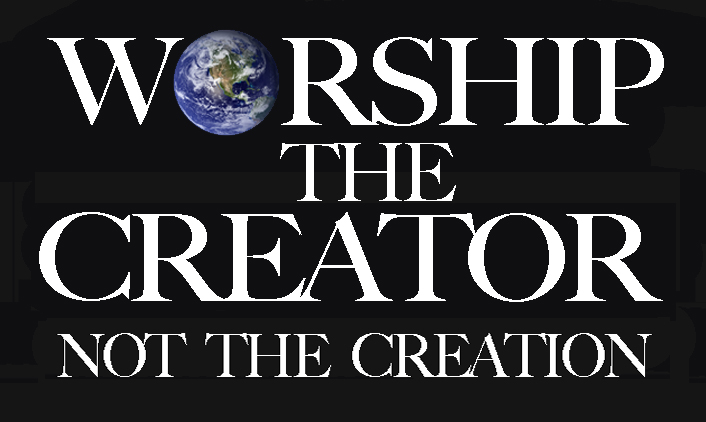
Brothers, above the starry canopy
There must dwell a loving Father.
Do you fall in worship, you millions?
World, do you know your Creator?
Seek Him in the heavens;
Above the stars must He dwell.
The original Biblical mandate to care for the earth did not ignore our Creator but in fact came from Him to whom we are accountable for creation: cf. Genesis 1:28 and 2:15. Christian's through the ages have affirmed this creation mandate as reason for both stewardship of the earth and for worship of the Creator (click here for PDF).
By all means, separate your recycling today with joy; and as you do, draw your
joy from the gift of creation and from your worship of Him who created you and
gave His life for you on the cross.
April 7, 2013
Yoga:
Though yoga will unavoidably remain controversial because Christian and Hindu worldviews cannot both be true, yoga is widely practiced by those who deny it's vital and unavoidable rootedness in Hinduism. My long-time pastor-scholar friend Ed Hird published a blog on the subject available here. (Should it not be available in the future, it is also available on this site, here.)
March 29, 2013
Good Friday
Good Friday is the day Jesus died on the cross for us, a gruesome execution at the hands of evil men. By what stretch of the imagination can that day be seen as good? The question is understandable
The first clue is that Jesus crucifixion was voluntary. Jesus could have avoided it with ease but he chose not only to give himself as a ransom sacrifice for us but to choose when to do so. Jesus chose the Passover celebration - the remembrance of a miraculous historical event in which God liberated His people from centuries of slavery in Egypt (Exodus 12) - to make clear that He was willing to be the lamb slain to set His people free (John 1:29: "See, the lamb of God who takes away the sin of the world").
It is this amazing voluntary gift, given in suffering and death, that Jesus encouraged us to remember in the breaking of bread and drinking of wine in what the church calls Eucharist (thanksgiving) or Communion. (Matthew 26:26-30; John 13)
But there is more. Who is it who
gave himself for us in this way to carry away our sins, set us free and give
us eternal life in the renewal of all things? It would have been noble if a
good man of remarkable character offered himself in this way. But it wasn't;
it was God incarnate who entered the world for this purpose. No mere man,
however noble, is of stature or worth equal to carry the sins of the
whole world! Only God could do this, and did, in Christ.
In this we see something which changes not only eternity but human history for immense good. Jesus once asked: "What do you benefit if you gain the whole world but lose your own soul? Is anything worth more than your soul?" (Matt.16:26) The value of the human soul is immense, immeasurably so. We need only to look at history or around us to see humans don't broadly value others this highly.
Let me put it this way: what is the value of a car or vacation or bottle of water? In principle, it's value is determined by the buyer. If no buyer is available the value remains unknown. In Christ's ransom sacrifice for us, what is the value Jesus put on us? The price of His own life and blood. How much is that? It is immense, immeasurable, unspeakably so, consistent with the value implied by Jesus question "is anything worth more than your soul?" The value God places on us is only a little less than the value of God himself. David writes of God in Psalm 8: "You have made man little lower than God." This is again consistent with Jesus question and the price he paid for us on the cross.
This has transformational consequences at all levels. Good Friday is the basis on which we can love ourselves. We now know our worth. The writer of the Christmas carol "O Holy Night" attempted to capture the joy of discovery of this worth in these words:
Long lay the world in sin and error pining,
Till He appeared and the soul felt its worth.
A thrill of hope the weary world rejoices,
For yonder breaks a new and glorious morn.
This has immense social consequences, as well. Materialism, in its various forms (Marxism, secularism), sees individuals, born or yet unborn, as having only the worth those which greater powers are willing to assign to them. The weak, the elderly, the unborn have no inherent value in a materialistic worldview and the 110 million who died at the hand of Marxism in the 20th century are evidence of this. Many other sad examples of the limited value of life can be cited among those who reject Christ's valuation of us on the cross.
But love itself - selfless, placing value on one another, serving the weak - is born of the value God has placed on us as demonstrated on Good Friday. Many supposed "western" values - such as human dignity leading to equality and human rights - while being eroded as the west loses connection with the Gospel, find their roots, historically and philosophically, in the Gospel of Christ centred in the cross of his sacrifice for us on Good Friday.
February 13, 2013
Towards a Theology of Suffering in the Context of Judgement:
This is not a cheerful subject and I wish it didn't appear necessary to consider. Yet if we don't reflect theologically on difficult matters, my experience is that frustration and confusion results, leading some to leave off following Jesus. So I take the plunge and welcome feedback.
Today I was struck by three emails symptomatic of an hourly media diet reflecting collapsing civilization - Syria's civil-war descent into hell with Christians alone without a militia, marriage between a man and a woman under attack on many fronts and the foundation of family continues to slide, and the candid admission from a leading abortionist that the life of an unborn child is indeed human and not different from our own but it has to be sacrificed to the will of the powerful, i.e. it is legal murder of a human being.
Sometimes I have to pray and process to keep emotional equilibrium in the chaos of a dying civilization. In it I seek to see through the eyes of God, and not only my own. I see...
-
Civilization collapsing under the weight of it's own corruption and unrighteousness.
-
God judging after great patience. God has the right to do so, and indeed, we would conclude God is evil if he did not so judge evil.
-
Continuing, and in many ways increasing, spiritual opposition to the message and implications of the Gospel in mainstream media, education, halls of political power, and, when that isn't enough, persecution of Christians in the streets. (I'm not saying Christians do no wrong but that most Christians who are persecuted are not persecuted for doing wrong but simply for being part of the group out of favour.)
Its not comfortable to see or reflect on, but we are called to be strong. Augustine wrote City of God as the Roman empire begin to disintegrate, seeking to make sense of it all. I can see why Martin Luther observed that when the pressures were greatest he needed to spend more time with the Lord.
Those of us raised with a Western
individualistic worldview need to be aware God, in righteously judging peoples
and nations, sees both individuals and nations and responds to those who
highhandedly reject His righteous reign. In other cases, nations seem to destroy
themselves from within. In both situations, individuals, though perhaps
comparatively righteous within the nation, are yet often directly affected.

The difficult fact is that sometimes the individual is spared the ripple effect of the internal collapse or of the judgement of the nation, and sometimes the individual suffers equally with the nation of which he/she is a part. We cannot pretend to fully understand why our experience within a declining or collapsing civilization varies so greatly. Yet, even in such painful contexts, we must continue to live by Kingdom principles as outlined in the Sermon on the Mount, share the Gospel pointing unceasingly to Jesus the rightful Lord and gracious Saviour, advocate for the persecuted, love those caught in collapse and judgement; always inviting a response to God's long-suffering extension of grace to those being affected. This was frequently the difficult role of the Old Testament prophet. We may need to read the prophets afresh from the vantage point of our world's current pain.
February 9, 2013
Truth: Foundational to Love
Is it loving to tell the truth? It appears in today's cultural climate, truth is often viewed as unloving. Political correctness frequently insists love means denying the foundational truth we believe in. In this stilted environment, we must not disagree, we are told for example, in such areas as the nature of marriage, appropriate means of sexual expression or the value of unborn children, or risk being branded unloving or worse. Whistleblowers in commerce or government, even when confronting error, are attacked for it as frequently as they are honoured. The same experience comes to those who challenge false ideologies, even when the truth of their challenge is undenied.
Yet truth is not only essential to transformation, but also to authentic love. (When we speak truth without grace, we need to make apology of course, but for the lack of grace, not for speaking the truth!)
While truth can be painful and subject to unjust charges from those who disagree, withholding truth can be in fact equally painful or even cruel. Ezekiel made clear a night watchman who does not notify the sleeping of danger is not loving, and is in fact culpable for his silence (Ezekiel 33).
Messianic Rabbi Jonathan Cahn (author of The Harbinger) rightly points
out "without truth there is no love." The context of the statement in the video
below is in response to would be detractors who will claim a prophetic warning
is unloving. While agreeing the prophetic warning to be politically incorrect,
Cahn denies it to be political. Rather "It will be biblical. It will be true...and
if I offend you, I apologize that I cannot apologize for offending you. Without
truth there is no love. On a day that so embodies the future course of this
nation (the President's inauguration), it's critical that we both pray and speak
the truth."
Cahn's word to America relates to the consequences of rejecting God's warnings to return to the foundations of the Gospel. Watch this remarkable address during a prayer breakfast on January 21, 2013, the morning of the inauguration of President Obama to his second term as Chief Executive of America.
January 29, 2013
Truth: Foundational to Transformation.
The assertion of almost any truth currently suffers much bad press. Post-modernity agrees with Pilate's
scepticism before Jesus: "What is truth?" (John 18:38). Vishal Mangalwadi
(Truth and Transformation: a Manifesto for Ailing Nations. Seattle: YWAM
Publishing) offers a vital corrective. Not only does truth
exist objectively but is the foundation of
needed transformation.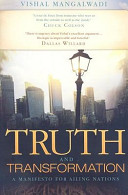
Mangalwadi begins with an experience from my country of origin. During a visit to the Netherlands, Mangalwadi accompanied a friend to a dairy farm for milk. As his neighbour was not home, his friend took the milk, placed correct change in a saucer provided for payment, and returned. The truths of the Bible (e.g. honesty, trust, treating one another with dignity) made this simple freedom possible. Without the acceptance of such truths, corruption, or at least a much more complicated society, results.
Our society, now lacking the underpinnings of such Biblical truth has produced much economic pain including Enron, Ponzi schemes and bailing out (with tax payer money) the corrupt banking systems, which had themselves produced the economic collapse of 2008, ripples of which continue to keep many working poor in needless hardship.
Without foundational respect for truth we can't even trust "the assured results of scientific research" (to bring to mind a confident phrase from grade-school days). Sly methodologies and outright lies (http://crev.info/2013/01/crooked-scientists-get-rehab) are now so unremarkable that, whatever your view of debates such as global warming, it increasingly seems science has as much in common with "old school" politics. "Pure" science, as conceived in my childhood, is science only to the degree truth is valued over politics, money or ideology.
January 13, 2013
On My 64th Birthday: Reflections on "Changing the World" after 45 years of Trying:
When I was young I didn't know the world needed redemption. As a child I enjoyed life and only gradually saw hints that anything was wrong. When responding to Christ as a teenager I began to reflect on what salvation was about but applied these reflections largely to myself. In my twenties I began to desire a vocation which would make a difference for good in the world. (It wasn't until later in life I heard an Indian friend put it this way: "We are born once. We will die once. Let's do some good in between.") Since that time I've served as pastor, church planter, mission strategist, trainer and coach in various settings.
During these 45 years the world has seen the growth of the evangelical church, particularly in the southern hemisphere and its decline in the northern hemisphere. It has seen the fall of the Iron Curtain and the expansion of Muslim fundamentalism. It has seen the rise of sexual freedom and the decline of the family; the rise of new technologies and a decline in reading, to name just a smattering of the changes.
But is the world a better place? I think not.
So what are my reflections on over four decades of trying to change the world? Let me venture a few observations:
1. I have no regrets. I know that Christ is and remains the Light that the darkness cannot overcome. I know that if I'd not done what I have in Jesus name, the world might even be, in some places, a little darker. There is no alternative to the light and love of Christ who truly makes all things new. I hope you too have chosen this path which leaves no regret.
2. I am encouraged by meeting 1000s of others over the years, equally or more committed and capable than I, who share the same obedience to Christ. They inspire me continually, and their sacrifice is greater than mine. I'm humbled, and renewed in my commitment and calling to follow Christ in mission to our fallen world.
3. I have no illusions. Jesus indicated in his parable of the wheat and the tares (Matt 13:30) that those who respond to the Kingdom of God and those who resist it will continue on parallel tracks to the day of His return. For this reason I am not discouraged when I see resistance to the Kingdom of God, even with violence; Jesus said this would be the case. This resistance does not, of course, mean I should cease scattering seed for more wheat. Rather the opposite; to mix the metaphor, the greater the darkness the greater the need for more love and truth and light. A good read on this: Vishal Mangalwadi on Truth and Transformation: A Manifesto for Ailing Nations.
4. I am committed to the next generation. The completion of my contribution is nearer now than at my last birthday. This makes it all the more important that I continue to invest in the next generation of those who will give their lives in following Christ to bring the "Light of Life" (John 1) into our still all-too-dark world.
As the writer of the hymn This is My Father's World affirmed: "Though the wrong seems oft so strong, God is the ruler yet." Please peruse other parts of www.murraymoerman.com which is themed: "Following Christ in Today's Challenging World."
January 6, 2013
Evangelism: An Atheists Perspective
My son brought to my attention observations by a convinced atheist, after being approached by a Christian who gave him a New Testament. His comments are important especially to Christians who have accepted the view of those who wrongly insist that evangelism is a violation of their human right to be left alone. The atheist says in effect: "I don't respect people who don't proselytize," implying the moral obligation that deeply held convictions should be shared. He goes so far as to say, with rare ability to put himself in the shoes of the person who believes something important that he does not believe: "How much do you have to hate someone to believe eternal life is possible and not tell them that?"
It's not that the atheist's mind was changed by the encounter. He reiterates: "I know there is no god and one polite person living his life right doesn't change that." But his point is that he respects Christians who are straightforward, sincere and respectful in sharing Christ, though he, at the time of his comments, remained unconvinced. His image of someone seeing a truck bearing down on an oblivious person, having the moral obligation to tackle the person before it's too late, is right.
So what's holding you back?
---------------------
1 I recognize the reference in Psalm 87 is technically to Zion rather than to Yahweh. Zion however is assumed to have its genesis in Yahweh, just as do the other examples in the blog entry (Oct 29, 2013).
